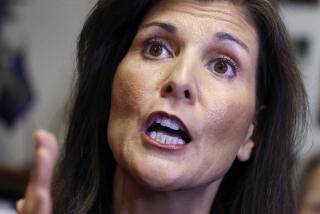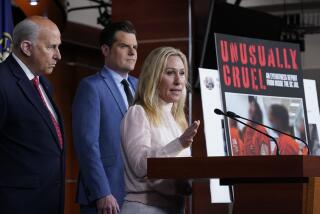U.S. Needs to Put the Iraqis in Charge, Gingrich Says
- Share via
WASHINGTON — Former House Speaker Newt Gingrich blasted U.S. policy in Iraq on Sunday, saying it has gone “off a cliff” by failing to put Iraqis in charge of governing and policing their own country.
The blunt criticism from Gingrich on NBC’s “Meet the Press” and in an interview with Newsweek magazine drew an immediate rebuke from White House Chief of Staff Andrew H. Card Jr., escalating an unusual public confrontation between marquee Republicans.
But Sen. Hillary Rodham Clinton (D-N.Y.), who recently returned from a trip to Iraq and Afghanistan, said she thought Gingrich was right. Clinton said on CBS’ “Face the Nation” that she was “amazed” to find herself in agreement with the former speaker, who during the 1990s was one of the most tenacious adversaries of her husband, then-President Clinton.
Gingrich, who now runs his own communications and consulting firm, is a member of the Defense Policy Board, an advisory panel that acts as a think tank and sounding board for the Pentagon. He is also a senior fellow at the American Enterprise Institute, a conservative public-policy center in Washington whose scholars have provided much of the ideological underpinning of the Bush administration, and is considered a close advisor of Defense Secretary Donald H. Rumsfeld.
He decided to go public with his views, he said, because the nation faces a “very serious problem” in Iraq. “The White House has to get a grip on this,” he said.
“I think the cliff we have gone off that we need to get back on is to put the Iraqis at the center of this equation -- not foreign governments, not the [United Nations], not more American troops,” Gingrich said. “Most Iraqis do not want to go back to a brutal, murdering, raping dictatorship. Most Iraqis want to have an organized way of governing themselves, but they want to be in charge of their own country.”
In his Newsweek interview, Gingrich said the U.S.-led administration in Iraq -- the Coalition Provisional Authority, or CPA -- is derisively known as “Can’t Produce Anything” by many in that country.
Asked about the former House leader’s comments, Card sounded a note of exasperation.
“Well, Newt Gingrich is not all-knowing, and I’m sure he has opinions, and he’s always expressed them,” Card said on “Face the Nation.” “But I can tell you from the perspective of the generals who are on the ground -- and Ambassador [L. Paul] Bremer [III], who is running the Provisional Authority over there -- things are going better than they could have been expected to go at this time, and we’re making great progress.”
Gingrich drew a contrast between Iraq and Afghanistan, where the United States and its allies moved quickly to recognize an interim government under President Hamid Karzai.
“From that point on, it was clear that the Americans were helping the Afghans,” he said.
To fail to apply the same template to Iraq was a costly error, he added. “I think it’s very dangerous, because the longer we keep Americans front and center, the greater the danger that Iraqi nationalism will decide it has to be anti-American.”
As for fears that a quick transfer of sovereignty would hand Iraq over to Islamic fundamentalists, Gingrich asserted those concerns are exaggerated.
“There’s no evidence that [Iraqis] are likely to do that,” he said. “It’s more likely ... to be some kind of loose governing coalition that has a strong Kurdish component, a strong Sunni component and a relatively slight Shiite majority.”
The U.S.-led coalition has appointed an Iraqi Governing Council to oversee many day-to-day functions and pave the way for elections. But the council lacks a strong leader. Clergy of the Shiite branch of Islam, which is followed by the majority of Iraqis, have become some of the strongest independent voices in the country.
Hillary Clinton, a member of the Armed Services Committee, agreed, saying “we should be moving toward some kind of sovereignty” in Iraq, but called for a more gradual transition under international supervision.
“I still believe we would be smarter to have some kind of transition that was internationalized, that would give legitimacy to this process,” she said on “Meet the Press,” on which she also appeared.
“Why don’t we set up some kind of international bridge?” she asked. “The U.N. can be playing a role, NATO can be playing a role. We can create some kind of new entity, the Iraq Reconstruction Stability Authority. We can do something that then gives, frankly, cover to other countries to come in and support us.”
Although the Bush administration has sought military and financial assistance for Iraq from other nations, it has been loath to relinquish control of the rebuilding effort.
Both Clinton and Gingrich said the United States cannot afford to fail in Iraq. While Gingrich blamed the policy “bureaucracy” for the problems, Clinton said the administration has failed to level with the American public about the true cost in commitments of troops and funding.
More to Read
Get the L.A. Times Politics newsletter
Deeply reported insights into legislation, politics and policy from Sacramento, Washington and beyond. In your inbox twice per week.
You may occasionally receive promotional content from the Los Angeles Times.










